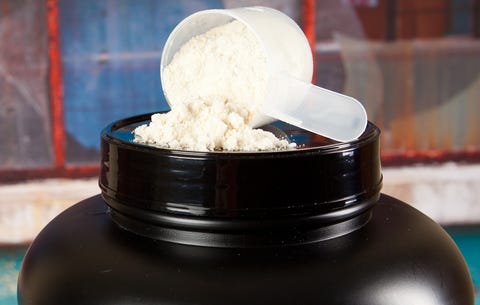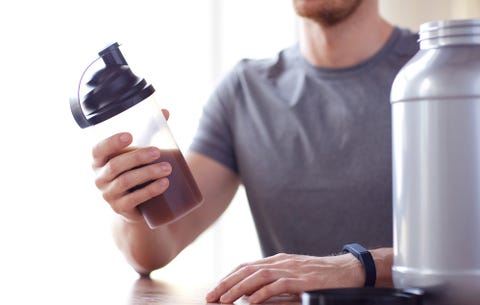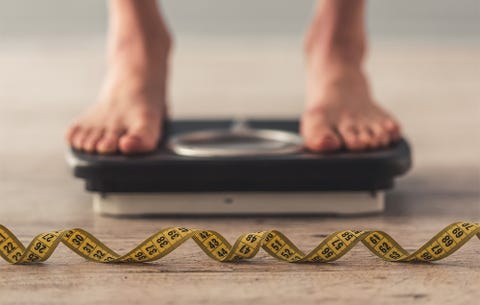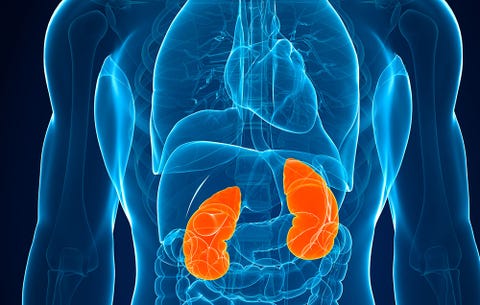Will Creatine Boost Your Gains? Here's Everything You Should Know
If you’ve ever set foot on a weight room floor, you’ve probably heard guys touting the muscle-building benefits of creatine. Maybe you’re even thinking about experimenting with it yourself.
Nobody should put anything in their body without weighing the benefits and risks first. That goes for everything from beer to ice cream to the amazing amino acid called creatine.
Here’s what you should know about taking creatine: what it is; what it does; and what the side-effects are.

Men’s Health
What is creatine?
Your body actually makes its own creatine, by way of your kidney and liver, after you eat protein. Your muscles then convert creatine into creatine phosphate, which is then generated into adenosine triphosphate (ATC), which your body uses for explosive exercise.
Supplement manufacturers have made creatine intake more efficient. Instead of consuming pounds of protein, all you have to do is take the nutrient in powdered, liquid, or pill form.
Also important: Creatine supplementation should be considered complementary to consuming protein, not a replacement for. That’s because creatine and protein work in different ways. In short, creatine leads to more strength during your workout while protein leads to more muscle repair after your workout.
What are the effects of taking creatine?
Creatine increases the body’s ability to produce energy rapidly. Creatine exists naturally in our bodies and helps fuel our muscles, which is why some people take it as a supplement to boost their performance in the gym.
The mechanism is straightforward: If you’re able to lift more weight in the gym, you’re able to create more of the muscle fiber tears that your body can then repair and rebuild bigger and stronger after your workout.
According to the U.S. National Library of Medicine’s MedlinePlus, creatine is rated as “possibly effective” when it comes to improving muscle strength.
“There is a lot of mixed research on creatine’s ability to improve muscle strength,” the government website says. “However, analyses of this research show that creatine seems to modestly improve upper body strength and lower body strength in both younger and older adults.” Creatine has also been shown to improve athletes’ performance in rowing, soccer, and jumping height.
“You should feel good about your creatine supplementation,” Men’s Health nutrition advisor Michael Roussell, Ph.D., says. “Take 5 grams of creatine monohydrate with your workout shake to help you get bigger and stronger.”
Although some research has pointed to creatine’s efficacy for high-intensity, explosive exercises like sprinting, the overall results have been mixed.

Shutterstock
What are the short-term effects of creatine?
One thing is almost certain: If you take creatine, you’ll gain weight.
“Creatine is a quick way to add muscle, but not without some water weight, too,” Carolyn Brown, R.D., a nutrition counselor at Foodtrainers. “Most people gain between two and four pounds of water retention in the first week.”
But that water weight is good, Roussell points out: “Creatine’s going to pull more water into your muscles, making your muscles bigger and fuller.”
What are the long-term effects of creatine?
After that initial retention period, subsequent gains are due to the increase in the workload you can handle, according to Paul Greenhaff, Ph.D., professor of muscle metabolism at the University of Nottingham in England.
Some guys think that if they take creatine and don’t work out, they’ll put on fat — but Roussell says it isn’t true.
“Creatine contains no calories, and has no impact on your fat metabolism,” he explains. “So taking creatine and not working out is just going to lead to nothing.”

Getty Images
What are the best forms of creatine?
Not all creatine supplements are made equal.
“If you’re going to add a supplement in, make sure it’s creatine monohydrate,” Brown said. “A lot of other supplements out there will have a lot of junk that you don’t need, and they’ll be much more expensive.”
Powder is the way to go. Studies show that liquid creatine and creatine ethyl ester (CEE) are unstable and break down in your blood system. Don’t bother with them.
Chad Kerksick, Ph.D., assistant professor of exercise physiology at the University of Oklahoma, recommends 100% pure creatine powder. Some companies add electrolytes and other ingredients, but tests indicate those do little to improve performance.
“Save money and buy creatine powder and [mix it with] fruit juice,” Kerksick says.
Fruit juice? That’s right — the sugar in the juice raises insulin levels, which helps increase creatine uptake into the muscle. Sports beverages work just fine too.
You need about 70 grams of simple sugars for every five grams of creatine, Greenhaff says. He suggests looking for a drink or supplement with 60 grams of carbs per 100 grams of product.
You’ll know the powder is of poor quality if it’s hard to dissolve and there’s residue at the bottom of your glass after you drink it. You want the powder in your muscles, not in the glass. If this happens, try a different brand.
And pills? While they’re effective, you often have to take a ton, especially during the creatine loading phase, in order to hit an effective dosage. If you love taking pills, go for it. For everyone else, powders seem to be the best bet.
Here’s a buyer’s guide for what to look for in a high-quality, effective creatine supplement.

Getty
What foods are high in creatine?
Just as our bodies produce creatine, the chemical is also found naturally in various foods.
“Creatine isn’t just found in supplements,” Brown said. “It’s actually found in beef, pork, and salmon.”
Try these recipes for creatine-rich meals:
Will creatine mess with my kidneys, blood sugar, or cause muscular dystrophy?
Don’t believe everything you read on Internet forums.
Researchers are constantly studying creatine for its effectiveness and safety. That’s why many trainers and health experts support the use of creatine: Studies indicate it’s safe.
“Creatine is one of the most-researched sports supplements out there,” Kerksick says. “And there’s no published literature to suggest it’s unsafe.”
There have been anecdotal reports of kidney damage, blood sugar concerns, heart problems, muscle cramps and pulls, dehydration, and diarrhea, in addition to other negative side effects. But the key word is anecdotal.
“I’m not saying people don’t experience cramps, but I don’t believe it can be very common,” Greenhaff says. “If there were any major adverse side effects, we would have seen them by now.”
Some of these conditions can be caused by consuming too much of certain vitamins, says Tod Cooperman, M.D., president of ConsumerLab.com. “Too much vitamin C can cause diarrhea, and too much iron may lead to stomach problems,” he says.
To be safe, he recommends using creatine only if you are healthy and have no kidney problems. That’s because your kidneys excrete creatinine, a breakdown product of creatine.

Getty Images
So there are no adverse effects of taking creatine?
Not so fast. If you can get big without it, there’s no reason to use creatine.
“I wouldn’t recommend doing anything that would show minimal improvement and possible risk,” says Jim King, M.D., president of the American Academy of Family Physicians. “Weigh the negatives and the benefits before you try it.”
Kids under age 18 should avoid creatine, King says. “Children are still in a growing phase, and we’re not sure what impact creatine may have on muscles and bones as they grow,” he says. “I feel very strongly that middle and even high schoolers shouldn’t use it.”
Will creatine increase my power, strength, and body mass?
Here’s one thing all the experts can agree on: It’s impossible to say.
Creatine has different effects on every individual. Some people just don’t respond to creatine — it’s a genetic thing.
If you’ve started taking creatine, you should know if it works for you in about a week. If your training volume increases, it’s working for you. If not, you’re probably a nonresponder, and taking the powder isn’t going to help you.
Diet is important. Since certain meats and seafood have high levels of creatine, vegetarians — i.e., people who don’t eat those creatine-rich foods on the reg — usually see a greater response. Those whose diets are highly carnivorous may see less change.
Of course, a healthy diet is key to anyone’s muscle-building plan. “If your diet is junk, there’s no point in adding creatine,” Kerksick says. “It’s better to eat good sources of carbohydrates and lean protein.”
In the end, creatine alone will not make you a bigger man.
“Only when combined with exercise does it improve the quality of training,” Greenhaff says. “You still have to do the work.”
Source: Read Full Article
